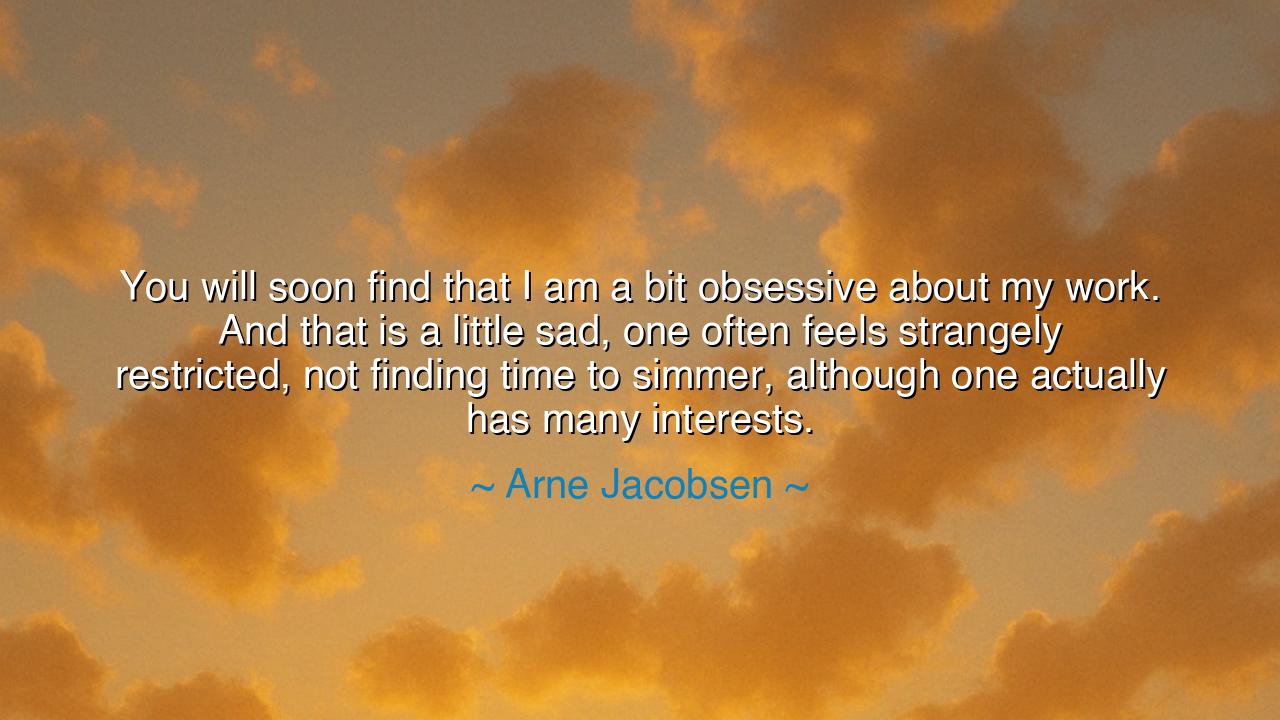
You will soon find that I am a bit obsessive about my work. And
You will soon find that I am a bit obsessive about my work. And that is a little sad, one often feels strangely restricted, not finding time to simmer, although one actually has many interests.






The words of Arne Jacobsen, “You will soon find that I am a bit obsessive about my work. And that is a little sad, one often feels strangely restricted, not finding time to simmer, although one actually has many interests,” strike with the weight of honesty and confession. They reveal the paradox of mastery: that greatness demands obsession, but obsession can narrow the vastness of life. He speaks with humility, as if admitting that his devotion to architecture and design, while fruitful, came at the expense of leisure, exploration, and the quiet joys of other pursuits.
The origin of this thought lies in Jacobsen’s life as one of the great modernist architects and designers of the twentieth century. He was the mind behind works of clarity and precision, such as the SAS Royal Hotel in Copenhagen, and the iconic Egg and Swan chairs. To reach such heights required an intensity of focus that allowed little rest. Yet in this statement, he unveils the cost of such single-mindedness: a sense of restriction, the sadness of a man who, despite having “many interests,” found them silenced under the weight of his calling.
This theme is as old as the ancients. Consider Archimedes, who in his obsession with mathematics and invention, often forgot to eat, bathe, or tend to anything beyond his discoveries. His brilliance gave the world new knowledge, but his life, consumed by the urgency of his mind, lacked balance. Jacobsen’s words echo this ancient story: the recognition that greatness is born of discipline and obsession, yet such focus often strips away the fullness of life’s tapestry.
There is something profoundly human in his admission. Many dream of being consumed by a passion, yet few understand the loneliness and exhaustion that come with it. Jacobsen reveals that even those who create marvels for the world may secretly long for the ordinary joys of free time, of wandering thought, of “simmering.” The greatness that inspires generations can, for the creator, feel like a cage of their own making.
Yet Jacobsen’s words do not reek of bitterness. Instead, they carry the quiet dignity of acceptance. He does not regret his work, but he acknowledges the sadness of its cost. This honesty itself is a gift, for it reminds us that even the most accomplished lives are not without trade-offs. His confession teaches us that balance, though difficult, must be sought—even in the life of the most devoted artist or worker.
The lesson for us is clear: pursue your calling with passion, but guard space for rest and curiosity. Do not allow obsession to harden into chains. Remember that the richness of life lies not only in achievement but in the quiet, unmeasured hours. Music, friendship, nature, wandering thought—these are as necessary for the soul as labor is for the body.
Practically, this means we must discipline ourselves not only to work but also to pause. Set aside time to cultivate interests outside your primary calling. Allow the mind to simmer, to wander, to explore. For in that space, creativity itself is renewed, and the soul regains its breadth. Jacobsen’s words serve as both a warning and a call to wisdom: to work with devotion, but never to forget that we are more than our labor.
Thus, the confession of Arne Jacobsen becomes a timeless teaching: obsession creates marvels, but it can also narrow the soul. To live fully, one must learn not only to build but also to rest, not only to focus but also to wander. In that balance lies not only greatness, but peace.






AAdministratorAdministrator
Welcome, honored guests. Please leave a comment, we will respond soon